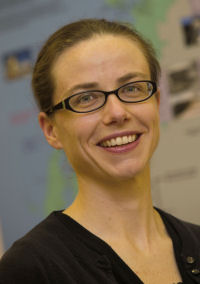 |
Heather J. Lynch, Professor (CV) Ph.D., Harvard University, 2006 Development and application of statistics Email: Heather.Lynch@stonybrook.edu Office: LS113 Phone: (631)632-9508 Lab Website: Lynch Lab Website |
Research Summary:
Dr. Lynch received her A.B. in physics from Princeton University in 2000, graduating
summa cum laude and receiving the American Physical Society's LeRoy Apker Award for
the best undergraduate physics thesis in the US. She continued her physics training
at Harvard University, but after receiving her M.A. in Physics, decided to transfer
into the Organismal and Evolutionary Biology Department to pursue her interest in
statistical ecology. Under the advising of Dr. Paul Moorcroft, Dr. Lynch received
her PhD in 2006 for her thesis "Spatiotemporal Dynamics of Insect-Fire Interactions".
As a post-doctoral research associate, and then assistant research scientist, in Dr.
William Fagan's lab at the University of Maryland, Dr. Lynch applied her expertise
in the statistical analysis of complex ecological datasets to a range of problems
including patterns of survivorship in mammals, biodiversity patterns in dendritic
ecological networks, and the effect of reproductive asynchrony in defining the geographic
range of the bagworm.
Dr. Lynch's research focuses on the development and application of statistics and mathematics to conservation biology. Her current research revolves around a large-scale vessel-based breeding bird survey program called the Antarctic Site Inventory, a project she manages in partnership with the non-profit research organization Oceanites. Her work to understand the complex spatiotemporal dynamics of Antarctic penguins, in particular their response to climate change on the Antarctic Peninsula, will bring a multitude of exciting opportunities for undergraduate and graduate students in the department. We are very excited about the strength in statistics and mathematics and added breadth in conservation biology that Dr. Lynch will bring to our department and anticipate that she will also strengthen connections between our group and others on campus.
